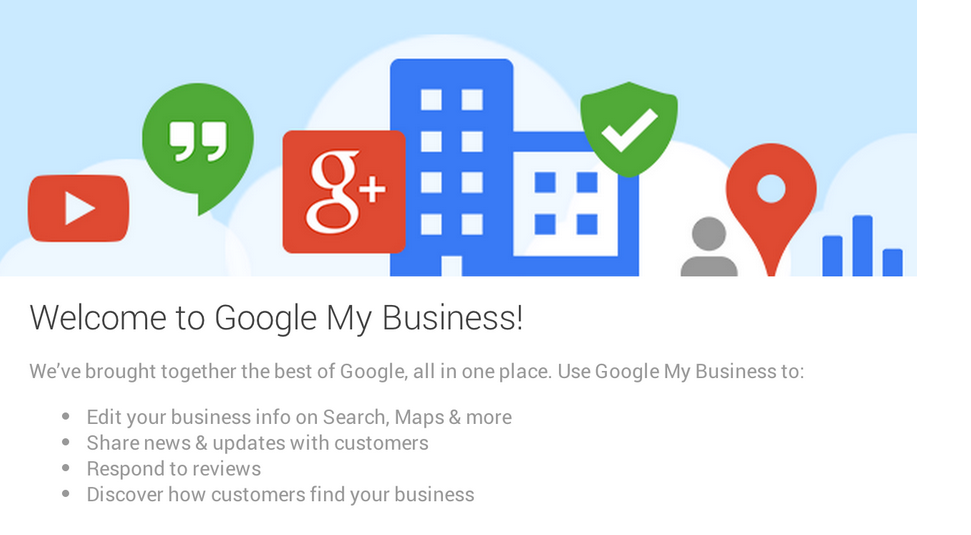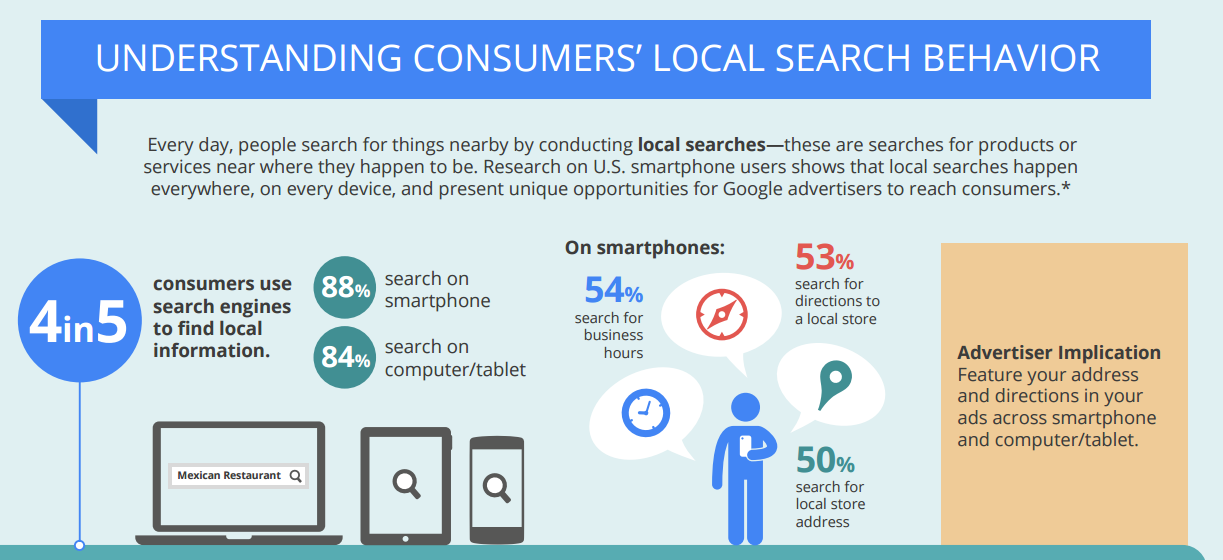How To Optimise Your Business For Local Search?
8 Tips On Promoting Your Business For Local Search
The survey, Understanding Consumer’s Local Search Behavior, which Google led in partnership with Ipso MediaCT and Purchased, had come to the following conclusion.
One. 4 in 5 internet users are interested in local search results.
Two. Businesses, which had optimised for and were discovered through local search, reported of increased sales.
Obviously, there’s more to the Google’s case study than these two rationales we handpicked for you here speak of. We recommend you to check out this survey.
The good news is that Local Search is effective in connecting the local consumers with the local service providers. And, there’s evidence that the Local Search going to get even more local (Google Glass and its focus on local search is just an indication of Google’s intentions). In other words, your office location and contact info are going to play an active role in directing traffic to your website or right to your door (depending on the nature of your business).
Here’s how you can optimise your business for local search.
1. Set up your business page at local search directories!
The first thing you need to do is to tell the search engine that you are open for local customers. How do you do this?
Just register your business profile at Google’s My Business page, then at Yahoo’s Local Listings, then at Bing’s Places for Business, and then some other search engines.
What do you need to set up your business at Local Places?
- Genuine local address (so that users can get directions and show up at your door)
- Working phone number (which the user can call to for query)
- Genuine photos of your company (ten or more)
- Videos (explainer video and/or lectures and presentations will help communicate your business)
- Working email address (for users to drop a mail)
Submit all information such that your Google listing, or that of any other local search directory listing, is at 100% profile completeness. This will ensure that you have a high local ranking, and the search engine will show your website to users searching locally.
Popular Local Search Directories and User Review Services:
Other than the listing service provided by the search engines, there are several websites dedicated to local search and user reviews. Claim your business in these local search directories to increase your search ranking as well as connect to consumers, and garner reviews and ratings.
- Yelp
- Superpages
- Yellowpages
- Angie’s List
- Insider Pages
- DexKnows
- Judy’s Book
- Merchant Circle
- City Search
- Foursquare
Note: To optimise your business for local search, you should find local search directories relevant to your country or place of business. Just google “local search directories of [your country]” and then select the good ones and enlist your business in there. For instance, the search for some “Local Search Directories of India” yielded the discovery of following local directories:
2. Keywords: The Search Query Gets A Home!
Here are two keywords:
“Best Restaurants”
“Best Restaurants in New York”
Which one of these two keywords do you think is targeted for local search? Right, the second one.
See, there’s just one difference in between keywords directed towards the global search and that towards the local search i.e. the name of the place that you want to perform the local search in (like the word ‘New York’ in the above example narrows down the search result to just the restaurants that are located in New York).
It’s called a geo-specific keyword, and they include both the product and place.
You can plan and analyze the potentiality of your keywords via Google’s Related Searches (it’s those search recommendations listed at the bottom of the Google search page) and/or the Keyword Planner, a helpful tool provided by Google AdWords, which can tell you how many average monthly searches a certain keyword yields.
So, the next time you are investing in advertisement aimed at Local Search, ensure that you use keywords of or related to this format:
- place + product (e.g. UK children bookstores, travel resorts California, best SEO companies in Delhi and so on)
Metadata: Needless to say, you should also implement these geo-specific keywords in the metadata field of your webpage such that your page title, snippet or meta description, and even the author details would help the local users to easily trace your webpage.
3. Build Up Citations for your Business!
When someone mentions your company in their website, that’s called a citation, and it is the leading source of inbound traffic.
Understand that citations do not necessarily have to be hyperlinked. A plain mention of your website or brand is good enough.
In this sense, citations are more like recommendations or a shout-out. And the more websites you get cited from, the higher your local ranking goes up in the search engine.
The most common ways to build citations for your webpage is through:
- Claim your business page in local search directories (as mentioned above in the first tip)
- Seek out relevant websites, which are not your competitors, and convince or pitch them to mention you in their websites. For instance, you can write about your company and what it is doing to help consumers, and then email the story to the right websites which engage with consumers that would be interested to hear about and support your brand.
- Enlist your business in your region’s chamber of commerce.
Or, you can invest on certain SEO tools to build up citations for you.
Reminders:
- NAP Consistency: Ensure that your brand’s name, address and phone (NAP, in short) is the same throughout all the different local directories that you are listed in. In addition, the web address too should be consistent.
- Claim: Sometimes you may find your business already listed in a local search directory. As is often the case, you might let that listing be as it is (provided the NAP information given is true), and just be thankful to whoever took the effort to list you in that directory. Don’t do this mistake. You ought to have your listing in your control, and not an unknown agent, who might change or delete your listing in future, thereby reducing your local ranking as well as disturbing your web traffic.
4. Improve your Mobile Local Search!
The Google local search survey that we mentioned earlier will also tell you that more than 60% of users look forward to local search and engage actively with the “click to call” and “get directions” features provided in your Local Page info. Obviously, they are mobile users since calling and mobility features is a mobile experience.
Source: Consumer’s Local Search Behavior Infographic
Reminders:
- Maintain a responsive website that mobile users can easily access.
- It’s a good practice to have the contact details on each and every page of your website such that consumers can always find it.
- Put yourself in the consumer’s shoes, and try the click-to-call and get-directions buttons and see if you end up at your office or not.
5. Reputation Management: Acquire and respond to reviews and testimonials!
Currently, the local search results give out 7 top sites. For consumers, that means 7 different choices. If your business is shown on the list, that’s good. But, how do you make sure that the consumers click on your link and not your competitors?
Well, this is where reviews and ratings can help you out. Consumers or, rather say, people in general have this tendency to visit websites that have higher star ratings and large number of reviews.
So, if you already don’t have some good client reviews, then it’s high time you ask/email your satisfied clients as well as subscribers to drop a good review.
Reminders:
- Ensure that your business has positive reviews. Negative reviews will communicate a bad image, and hamper your sales.
- Respond to both positive and negative reviews. Thank your consumers if they like you or apologize if they complain of bad service and, where possible, offer exchange, repair or refund services (or other means of correction depending upon the nature of your business). This would help build trust.
Note: Customer service is an essential part of business, and there’s evidence of new businesses outranking their old and established competitors just by offering really good customer service.
6. Promoting Local Search via Social Media!
Go where the people are, and engage with your consumers. Build up a relationship, and turn customers into loyals. So even if a better brand comes up, your consumers will stick with you.
Here are some popular social networks that can help your business converse with consumers.
Open up your business page in all these social networks and other relevant ones, as per the nature of your business, such that people can find you, add you to their network and engage.
7. Building Reliable Links for your Local Search!
As with any product/website promotion, SEO plays a big role in letting your targeted consumers discover your business.
Now, since you are focusing on local search, make use of geo-specific keywords and drop backlinks in relevant local websites such that your local ranking gets better than your competitor’s. Google Analytics and Facebook Insights (once you start engaging actively through Facebook) can help you see if your SEO campaigns are converting into traffic and/or sales.
8. Testing!
Test your keywords and see if you get shown in the local listing. Do further keyword promotions if needed via proper SEO channels until your business page appears in the local search listings.
Besides, do check out the information shown in the local listing, especially the address and contact info, and ensure that they are true.
Check out that click-to-call and get-directions buttons and see if you end up at your office or not.
Conclusion
Local SEO is effective in promoting your business for local search, and leading local consumers to discover your product/brand. All you have to do is to follow the above mentioned guidelines to strengthen the local presence of your company, and then test and tie up the loose ends, including the strategic development of a conversion-focused landing page, such that when your consumers finally find you through local search, you are ready for them.
Subscribe to Crackitt's Visual Marketing Workshop
Get exclusive visual marketing lessons and business growth hacks right inside your inbox.
Previous:














